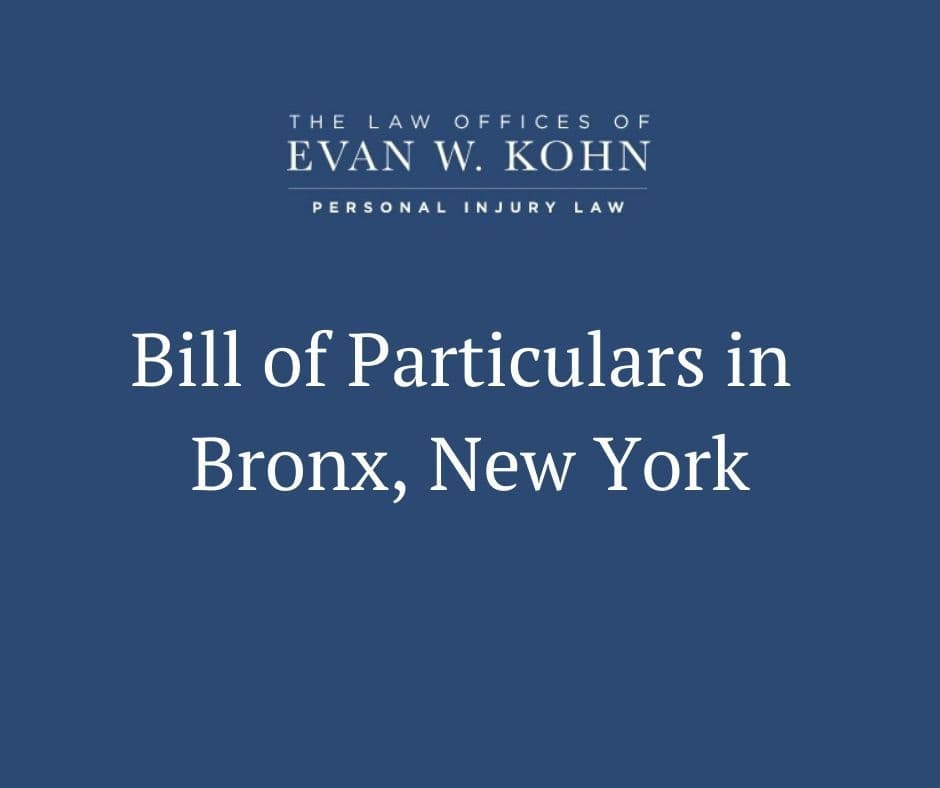Bill of Particulars in New York
Lawsuits are complex. Even a case that seems simple and straightforward on the surface may be much more complicated when the details are known. In order to get those details, a Demand for a Bill of Particulars may be needed.
What is a Bill of Particulars?
In New York, a Bill of Particulars is the written response to a Demand for a Bill of Particulars.
A Demand for a Bill of Particulars is “a list of written questions from one party to another asking for details (particulars) about a claim or defense.” While it is not technically considered discovery, a Demand for a Bill of Particulars can be used to get information regarding a claim or defense.
Depending on the type of case, only certain details may be requested in a Demand for a Bill of Particulars. In a personal injury case, for example, New York law permits a statutory list of items that may be demanded.
What items can be demanded in a Bill of Particulars in New York?
According to New York Civil Court Rule 3043, a Bill of Particulars in a personal injury case may involve responses to the following items:
- Date and approximate time of day of the occurrence
- Approximate location of occurrence
- General statement of the acts or omissions constituting the negligence claimed
- Where notice of a condition is a prerequisite, whether actual or constructive notice is claimed
- If actual notice is claimed, a statement of when and to whom it was given
- Statement of injuries and description of those claimed to be permanent, and in action designated in subsection (a) of section five thousand one hundred four of the insurance law, for personal injuries arising out of negligence in the use or operation of a motor vehicle in this state, in what respect plaintiff has sustained a serious injury, as defined in subsection (d) of section five thousand one hundred two of the insurance law, or economic loss greater than basic economic loss, as defined in subsection (a) of section five thousand one hundred two of the insurance law
- Length of time confined to bed and to house
- Length of time incapacitated from employment
- Total amounts claimed as special damages for physicians’ services and medical supplies; loss of earnings, with name and address of the employer; hospital expenses; nurses’ services
Responding to a Demand for a Bill of Particulars
If you have received a Demand for a Bill of Particulars, you typically have 30 days to respond to it with a written Bill of Particulars. In your response, you must either answer the questions in the Demand or object to them. The Bill of Particulars must include the name and index number of the case at the top of the page. You must sign the bottom of the document in the presence of a notary public and make a copy of the document to retain for your own records.
The notarized Bill of Particulars must be delivered to the other side’s attorney by someone over the age of 18 who is not a party to the lawsuit. They can deliver the Bill of Particulars personally or via First Class Mail with a certificate of mailing as proof of the date you mailed your answers.
You may object in writing to any of the items in the Demand for a Bill of Particulars if you feel the questions ask for more details than necessary, are too vague, or on any other appropriate ground. Your objection must be made in writing within 30 days of when you received the Demand. Failure to respond to or fully comply with a Demand for a Bill of Particulars can result in the party seeking the Bill of Particulars asking the court to order you to comply. If the court finds that your failure to respond is willful, it can impose penalties.
Involved in a personal injury claim in New York?
If you or a loved one suffered an injury and has received a Demand for a Bill of Particulars, your responses can impact the outcome of your case. An experienced personal injury lawyer Bronx like Evan W. Kohn can help. We are adept at handling all aspects of your New York personal injury claim, including the Bill of Particulars. Se habla español. Contact our office today or call us at (718) 409-5500 to schedule a free consultation.
CONTACT INFO
2000 White Plains Rd, Bronx, New York 10462
info@bronxlawfirm.net
24 hours, 7 day a week
